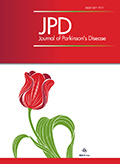Authors: Walker, Matthew D. | Volta, Mattia | Cataldi, Stefano | Dinelle, Katherine | Beccano-Kelly, Dayne | Munsie, Lise | Kornelsen, Rick | Mah, Chenoa | Chou, Patrick | Co, Kimberley | Khinda, Jaskaran | Mroczek, Marta | Bergeron, Sabrina | Yu, Katrina | Cao, Li Ping | Funk, Natalja | Ott, Thomas | Galter, Dagmar | Riess, Olaf | Biskup, Saskia | Milnerwood, Austen J. | Stoessl, A. Jon | Farrer, Matthew J. | Sossi, Vesna
Article Type:
Research Article
Abstract:
Background: A major risk-factor for developing Parkinson's disease (PD) is genetic variability in leucine-rich repeat kinase 2 (LRRK2), most notably the p.G2019S mutation. Examination of the effects of this mutation is necessary to determine the etiology of PD and to guide therapeutic development. Objective: Assess the behavioral consequences of LRRK2 p.G2019S overexpression in transgenic rats as they age and test the functional integrity of the nigro-striatal dopamine system. Conduct positron emission tomography (PET) neuroimaging to compare transgenic rats with previous data from human LRRK2 mutation carriers. Methods: Rats overexpressing human LRRK2 p.G2019S were generated by BAC transgenesis and compared to
…non-transgenic (NT) littermates. Motor skill tests were performed at 3, 6 and 12 months-of-age. PET, performed at 12 months, assessed the density of dopamine and vesicular monoamine transporters (DAT and VMAT2, respectively) and measured dopamine synthesis, storage and availability. Brain tissue was assayed for D2, DAT, dopamine and cAMP-regulated phosphoprotein (DARPP32) and tyrosine hydroxylase (TH) expression by Western blot, and TH by immunohistochemistry. Results: Transgenic rats had no abnormalities in measures of striatal dopamine function at 12 months. A behavioral phenotype was present, with LRRK2 p.G2019S rats performing significantly worse on the rotarod than non-transgenic littermates (26% reduction in average running duration at 6 months), but with normal performance in other motor tests. Conclusions: Neuroimaging using dopaminergic PET did not recapitulate prior studies in human LRRK2 mutation carriers. Consistently, LRRK2 p.G2019S rats do not develop overt neurodegeneration; however, they do exhibit behavioral abnormalities.
Show more
Keywords: Parkinson's disease, LRRK2 protein, human, dopaminergic neurons, transgenic rats, dopamine, brain imaging, positron-emission tomography
DOI: 10.3233/JPD-140344
Citation: Journal of Parkinson's Disease,
vol. 4, no. 3, pp. 483-498, 2014
Price: EUR 27.50






